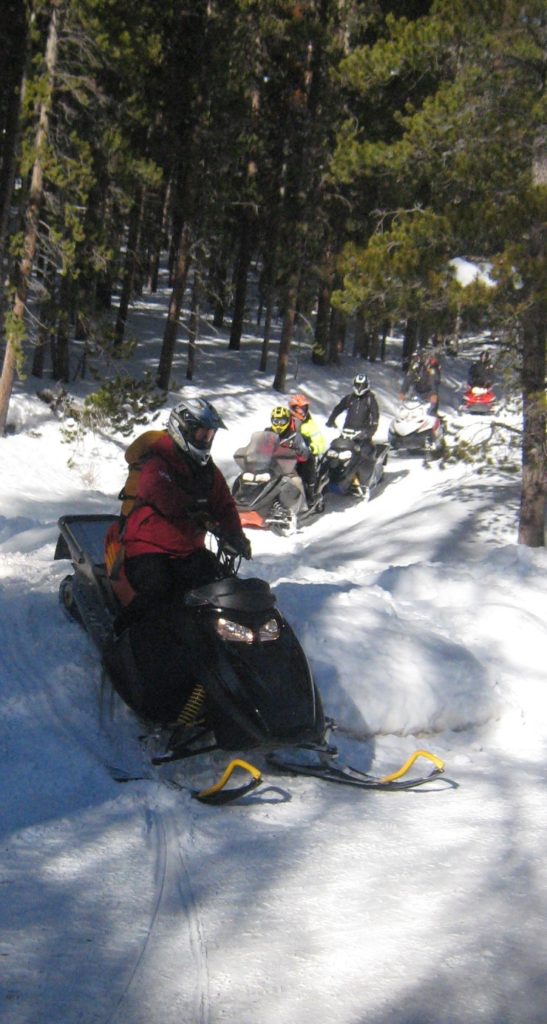Published by the Summit Daily in 2007
I had never been so cold in my life.
After a couple hours of riding, getting stuck, digging out and riding again, we were at the top of the trail. The wind howled and snow blew sideways. I got off the back of Warren’s machine, sunk two feet into the snow, and staggered toward firmer ground. I must have looked cold; Ben shouted, “Who’s got hand warmers or extra layers for Anna?” I took some hand warmers gratefully.
“I’ll be alright once we get going,” I told everyone. Hunter and I strapped on snowshoes, shouldered our packs, and headed for the ravine we believed the missing snowmobilers to be in. I was grateful to get moving and felt sorry for my teammates who would have to wait on top for us in the fierce wind.
We hiked for a couple of hours, following snowmobile tracks down into the ravine through increasingly dense woods and steep terrain, marveling at the skill and audacity of the men who had managed to ride it. We talked on the way, speculating about our subject’s chances of surviving the night. They had been out since noon, and it was now 10 p.m., with temperatures estimated at 25 below.
Near midnight, we came across a snowmobile crashed into a tree. Tracks led away, into deeper, denser trees. We continued to follow them, and not long after, we heard shouts from below us.
“Boy are we glad to see you!” one of the men said, grinning. They were huddled around a fire, their remaining two snowmobiles buried in deep snow nearby. Somehow, no one had suffered serious cold injuries yet, and all three were able and willing to walk. In fact, the only reason they couldn’t follow their tracks and hike back out on their own was because they didn’t have snowshoes.
Hunter pulled a Jet Boil out of his pack and began to make tea for the three men, while I radioed Command to ask them to send in a team on skis with extra snowshoes. It would be a long night hiking the snowmobilers back up to the top of the gulch, but we were lucky; if they hadn’t been able to walk, it might have been a long couple of days.
Lessons Learned
Like many people who are rescued in the backcountry, the men did a few things right and a few things wrong.
- Never go alone—They didn’t. There were three of them.
- Tell your friends your destination and expected time of return—At least two of the men had told their wives where they were going. One was expected to pick up a child at daycare at a certain time, and when he didn’t show, his wife knew they were in trouble. And although it’s never wise to rely on a cell phone, it doesn’t hurt to have one. In this case, there wasn’t a strong enough signal for a phone call but one of the men was able to send a text message to his wife and tell her that they were stuck. His message also said that he could see the lights of Keystone from his location, and that gave us an excellent idea of where to begin our search.
- Bring the right gear and be prepared for the weather—The men get both high and low marks for this one. They had a means of starting a fire, and that may have saved them from serious cold injuries. They were well dressed in layers. But they didn’t bring snowshoes. Snowshoes and shovels are an absolute necessity for snowmobilers because of the potential to get stuck.
- Be aware of your surroundings and the weather, and plan your return route—The three snowmobilers had continued down a steep ravine, becoming increasingly aware that they wouldn’t be able to ride back up. They believed they could continue downhill to the road below. If they’d checked a map, they would have realized that even if they could continue to navigate the burly terrain, they were headed for cliff bands. Always bring a map and compass, and if you aren’t completely sure of your return route, turn around and go back the way you came before it’s too late.
- If you get confused, STOP! Stay put and stay warm—The snowmobilers did exactly the right thing when they stopped and built a fire. Had they continued to wander around it would have been harder for us to find them.
Always make sure you’re prepared for things to go terribly wrong when you play in the backcountry—it may save your life one day.

Comments are closed.